Recent Storm Damage Posts
5 Tips To Prepare Your Business In Forsyth County For Tornado Season
3/24/2023 (Permalink)
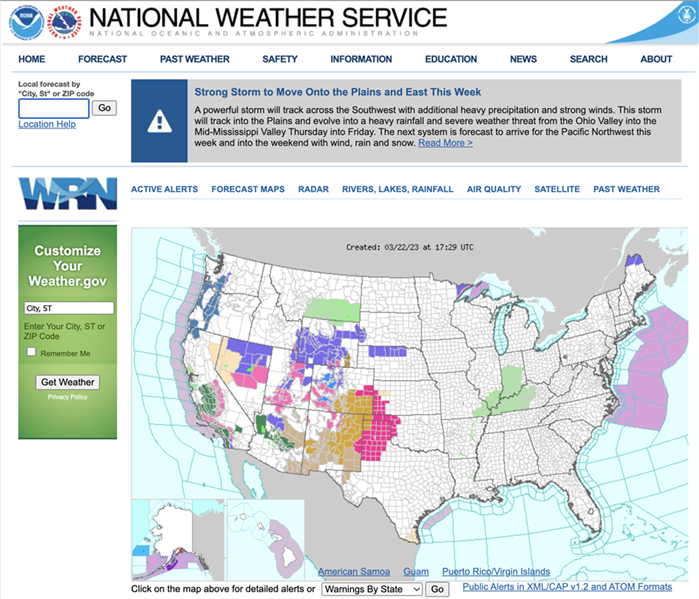 Weather.gov is a great resource to view your area's current and historical weather here in Forsyth County, GA.
Weather.gov is a great resource to view your area's current and historical weather here in Forsyth County, GA.
As tornado season approaches, it is important for those in Forsyth County to be prepared. Businesses of all sizes must be ready for the unpredictability of severe weather and the possibility of a tornado occurring. With some simple steps, businesses can ensure they are ready and protected from any potential danger. In this article, we will provide five tips to help prepare your business in Forsyth County for tornado season.
The severity of tornadoes varies greatly, and it is essential for businesses to understand the necessary precautions that should be taken when a warning has been issued. Preparation can mean the difference between life and death for those in the path of a tornado. It’s crucial to have an emergency plan in place that keeps employees safe and minimizes commercial property damage if a tornado does occur.
With these five tips, businesses in Forsyth County will have everything they need to protect their livelihoods from the threat of tornadoes this season. By following these precautions, you can rest assured that your business is as prepared as possible should disaster strike.
Understand The Risks
It's important for businesses in Forsyth County to understand the risks associated with tornado season. Tornadoes can cause extensive damage, so it's essential to be prepared. Knowing the potential risks is the first step to protecting your business.
Start by researching the tornado history of your area and understanding what types of tornadoes have been reported in Forsyth County. You should also look up information about current weather patterns and climate conditions that could lead to tornadoes. This will help you understand how severe they could potentially be if they occur in your area during this season.
You should also familiarize yourself with what type of structures are vulnerable to tornado damage, such as mobile homes or buildings with weak foundations like external storage sheds. Having an understanding of which structures are most at risk can help you better prepare your business for a potential tornado. With this knowledge, you can take actionable steps to ensure your business is safe from tornado-related damage.
By taking these precautions now, you'll be able to more effectively protect and secure your business from any potential harm that may come during tornado season here in Forsyth County.
Develop An Emergency Plan
Now that you have a better understanding of the risks associated with tornado season in Forsyth County, it's important to develop an emergency plan. This plan should contain steps that you and your employees can take to stay safe when a tornado is approaching or already on the ground. It should also address how you will respond if your business suffers damage from a tornado.
First, make sure that all employees are aware of their roles and responsibilities during a tornado warning or event. You should also create an evacuation plan so that everyone knows where they need to go in the event of a tornado. Include designated meeting spots both inside and outside the building so that everyone knows to gather there after evacuating. Additionally, it's important to do regular drills to practice this evacuation plan.
In addition, consider creating an emergency kit for your business that includes items like bottled water, flashlights, non-perishable food items, blankets, first aid supplies and any other necessary items for sustained periods away from the business premises. It's also important to have contact information for local emergency services and list any medical needs of employees that may require special attention in the event of an emergency situation due to a tornado.
By taking these precautions now, you can help ensure that your business is prepared for any potential tornadoes during the season ahead.
Secure Property And Equipment
It's important to secure property and equipment during tornado season. To do this, you need to make sure that all external windows are closed and locked. Secure furniture, computers, and other equipment by anchoring them to the walls or floors, if possible. Move any items that could become projectiles in strong winds inside your building or a secure storage area.
You also need to prepare for power outages by having a backup generator on hand. This will ensure that essential systems such as lighting, communications, and security can remain operational even when the power is off. Additionally, check all of your emergency supplies and restock if necessary. This should include flashlights with extra batteries, non-perishable food items, first aid kits, and plenty of bottled water.
Finally, prepare your staff for severe weather warnings by training them on what to do in case of an emergency such as a tornado. Make sure they know where to take shelter in the building or outside if needed as well as who is responsible for notifying emergency services. It's also important to have a plan for communicating with employees after the storm has passed so everyone can be accounted for quickly and easily.
Train Employees On Safety Procedures
It's important to train employees on safety procedures during tornado season in Forsyth County. Every office should have an emergency plan that outlines what staff should do if a tornado is approaching. The plan should include steps such as where to go and how to respond. All employees should be familiar with the plan and know how to execute it in case of an emergency.
Additionally, all staff should be trained on the basics of tornado safety. This includes understanding what a tornado watch and warning mean, knowing when to seek shelter, and understanding how to stay safe if caught outdoors during a storm. Employees should also be aware of the risks associated with severe weather conditions so they can make informed decisions about their safety during a tornado event.
Finally, employers should provide employees with access to resources such as online courses or materials that explain proper tornado safety protocols. By making sure everyone is properly trained and knowledgeable about emergency plans, businesses in Forsyth County can be better prepared for any potential storms during tornado season.
Stay Informed Of Weather Alerts
It is essential to stay on top of weather alerts in order to prepare your business in Forsyth County for tornado season. Monitoring local news outlets and signing up for emergency alert notifications can help keep you informed. Additionally, familiarizing yourself with the local warning systems and how they are activated is a critical step in staying ahead of severe weather occurrences.
The National Weather Service provides detailed information about current weather conditions and the potential for severe weather outbreaks. They use various tools such as radar and satellite imagery to identify impending storms and will issue warnings if necessary. Monitor their website or social media accounts for updates that could impact your business operations.
It is also beneficial to have a plan in place to inform employees of any impending danger from severe storms or tornadoes. Establishing an emergency alert system, such as text message or email alerts, to communicate quickly with staff during severe weather events can be instrumental in reducing risk and ensuring everyone's safety.
By staying informed with regular updates from reliable sources, ensuring everyone is aware of safety protocols and having an emergency alert system ready to deploy, your business will be well-prepared for tornado season in Forsyth County.
Spring Weather Hazards in Georgia | SERVPRO® of Forsyth and Dawson Counties
3/25/2022 (Permalink)
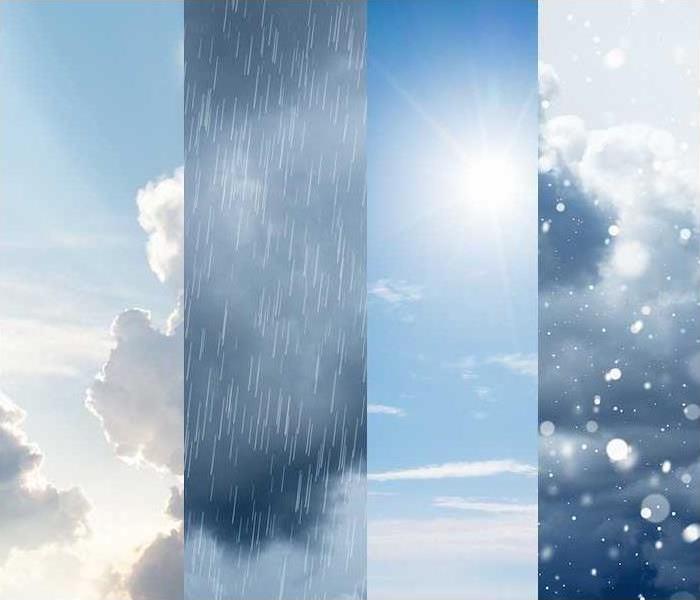 Extreme temperature changes can lead to severe weather. SERVPRO of Forsyth and Dawson Counties is a click away if you experience any damage.
Extreme temperature changes can lead to severe weather. SERVPRO of Forsyth and Dawson Counties is a click away if you experience any damage.
The United States is one of the world’s largest countries, second only to Russia and Canada in terms of total land area (though China is larger if all outlying US territories are excluded).
Seasonal weather isn’t one-size-fits all in a country with such a large and diverse territory under one umbrella—various parts of the nation experience distinct weather patterns, and hence face weather threats of differing degrees throughout the course of the year.
As spring approaches and warm and cold air masses meet throughout the country, let’s take a look at what different weather events to anticipate in some of the main regions, as well as what we need to be aware of here in Georgia.
During the spring months, the Pacific Northwest is prone to severe rain, which may bring floods and water damage to homeowners. Snow will continue fall at higher altitudes, and the melting and runoff from that will bring issues of its own.
The Upper Midwest and Northeast have the longest winters to face as cold weather will stick around for the whole season. Extreme cold and the threat of snowstorms and blizzards may be expected stretching from Maine to the Dakotas until late spring or perhaps early summer, when temperatures begin to rise.
On the other hand, the southern West Coast will have to watch out for excessive heat waves that could endanger lives and safety, and the South Pacific, including Hawaii, will be on the lookout for possible tsunamis caused by tectonic activity.
Windstorms, derechos and the possibility of wildfires will be a concern for the center of the nation, from Iowa to Texas. Wildfires can readily spread when winds are strong and seasons are dry. And, of course, part of this region is Tornado Alley, which has a high frequency of tornadoes.
Finally, extreme weather is possible in the Southeast, including here in Georgia, ranging from tornadoes and severe thunderstorms in landlocked states to hazardous rip currents on the coast and hurricanes in the spring. Thunderstorms are common in Georgia, particularly in the spring and summer months. Oftentimes, remnants of tropical storms coming in from coastal states can also cause severe flooding.
Extreme weather is a considerable hazard in the United States, regardless of where you live. Yours may differ from your friend’s a few states away, but knowing how to be prepared is always a good idea.
If extreme weather leaves you with damage from water, fire or other elements, help is a click away. Contact SERVPRO of Forsyth and Dawson Counties for local, fast, expert recovery.
Flood Cleanup: Mitigation Versus Restoration
2/2/2022 (Permalink)
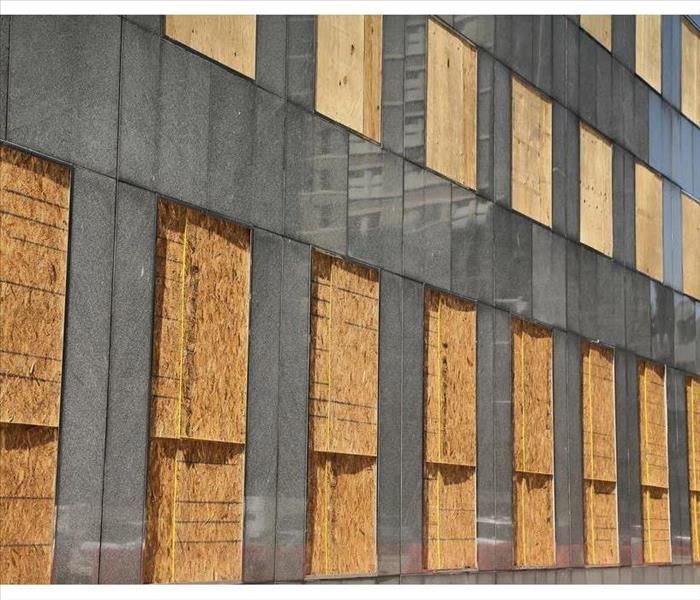 Board up building services to a building in Mcdaniel, GA.
Board up building services to a building in Mcdaniel, GA.
Mitigation vs Restoration
When your business has been flooded, you are likely going to hear a couple of terms thrown around: mitigation and restoration. These terms refer to the initial cleanup and rebuilding of your business so that it is functional. You have the option of either going through several companies that specialize in the individual tasks associated with the overall rebuilding of your business, like a flood cleanup company, or choosing a restoration firm that specializes in the full-scale process. In either case, it is beneficial to understand the terms and what they entail.
1. Mitigation
Mitigation refers to the first aspect of flood cleanup, and it is the process of protecting your facility from further damage that may nullify your insurance claim. There are two processes commonly used in the mitigation process.
1. Board Up and Tarping
Boarding up refers to the covering of broken windows, doors and other structural holes with plywood. Tarping refers to the covering of any holes in the roofline with tarps.
2. Initial Cleanup and Cleanout
Once the area is secure, a flood cleanup company will move on to removing excess water and other debris. This process will be followed by the cleaning and disinfecting of the affected areas.
The mitigation process is the first and fastest part of the restoration process. Mitigation creates a clean and safe environment for restoration specialists to assess and remedy the rest of the disaster area.
2. Restoration
A restoration company in the Mcdaniel, GA, area is likely all-encompassing, meaning that it will be able to perform the mitigation work as well as the restoration. The restoration process is lengtheir than mitigation and probably involves demolition and construction.
A flood cleanup company may only specialize in the mitigation part of disaster recovery, while a restoration company may be able to work on every aspect of the project. While you are welcome to pick whichever service suits your needs best, a restoration specialist is likely the best option in major disasters.
Flooded Streets and Vehicles: Why You Shouldn't Drive Through Floods
1/12/2022 (Permalink)
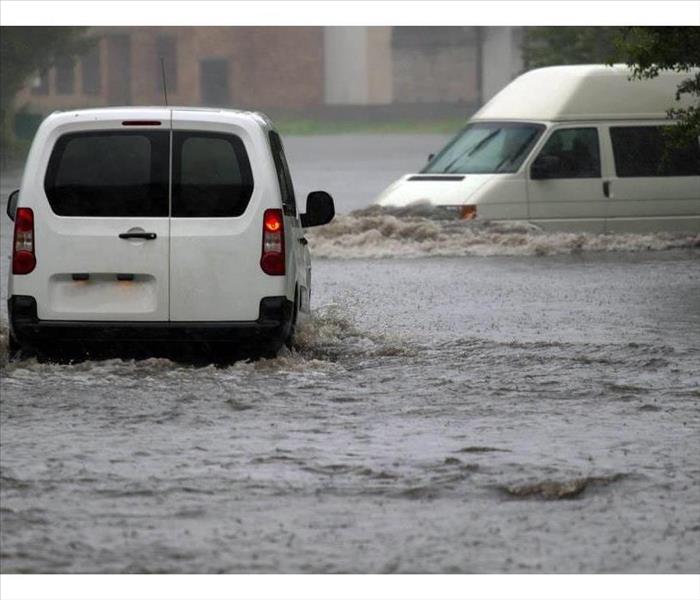 Avoid driving through flooded streets.
Avoid driving through flooded streets.
Why You Shouldn't Drive Through Floods
A flooded home is one thing. There is an understood protocol in dealing with a flooded home, and it is to stay dry and call emergency restoration services in the Dawsonville, GA, area after the damage is done. But, flooded roads offer a different and deceiving problem. A flooded street that looks intimidating to walk down may not look that scary from the inside of your vehicle, but floodwater should never be underestimated.
1. Depth of Water Can Be Deceiving
True, the water level may only be about 12 inches deep, but that level of rushing water is enough to carry a small car, and if the depth increases to 2 feet, then it can carry almost any vehicle. Despite the weight of most vehicles, it is no match to the surge and power of rushing flood water, no matter the depth.
2. Loss of Control Can Be Immediate
The second your car begins to float you have lost all control. Steering, accelerating, and breaking will do nothing to help you maneuver obstacles in the flooded street. A vehicle becomes a projectile with a passenger.
3. Water Can Flip A Vehicle
As waters rise, it is possible that your floating vehicle will roll and flip upside down, which can make it difficult and dangerous for an escape attempt. It is also important to note that the water does not have to be significantly deep to flip your vehicle. The same 12 inches that can move your car can also flip it.
4. Water Is Equally Dangerous for People
While it is dangerous to drive in a flood, it is even more dangerous to walk in a flood. That is why the essential safety and travel tips for flood zones are:
- Stay Dry
- Stay Safe
- Seek Higher Ground
If you are trapped in a vehicle on a flooded street with moving water, then stay inside your car until help arrives. If your vehicle begins to flood, then move to the roof of your car, but do not enter moving water. Flood water is dangerous, and your safety is paramount.
What Causes Sewers To Back Up After a Storm?
11/10/2021 (Permalink)
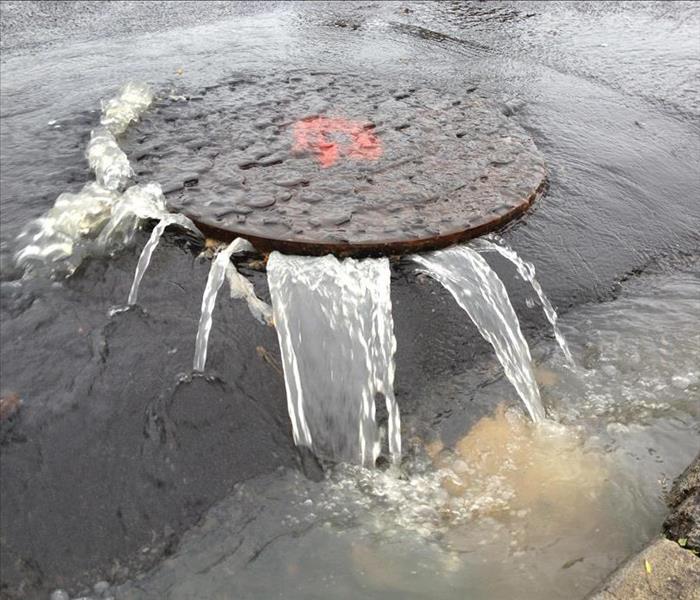 Heavy rain can cause municipal sewer systems to become back up.
Heavy rain can cause municipal sewer systems to become back up.
Why Rain Water Can Lead To a Sewer Backup
Municipal sewer systems can become overwhelmed and back up due to heavy rain. There are three common reasons why excessive rain water can lead to a sewer backup.
1. Increased Development
A storm sewer system that serves a municipality that has experienced a lot of rapid development may not be able to keep up with increased runoff levels. This can cause storm water to back up into the drains of commercial properties and homes in the region. Commercial property owners may want to consider an insurance endorsement or preventative plumbing solutions for frequent backups.
2. Poor Sewer Maintenance
The city also may not be doing a sufficient amount of sewer maintenance. Unfortunately, even if the municipality is to blame for a sewer backup, it is probably not liable for the cost of removing black water and restoring commercial property damage. Sewer backups are also commonly excluded from commercial property insurance policies. You may want to add a sewage damage endorsement to a policy to cover mitigation and restoration costs.
3. Lack of Dedicated Storm Sewers
If a municipality does not have enough storm sewers, flooding and backups may happen every time it rains heavily. If this is the case, a commercial property owner may want to consider having a basement drain raised and an ejector pump installed or having a sewer backwater device such as a check valve or gate valve installed. Keep in mind that waste and storm drainage cannot flow through while this valve is closed, which may make it less desirable for installation in large commercial buildings.
If you own commercial property in a region that frequently experiences sewer backups due to rainwater, the best option may be an endorsement on a business property insurance policy. This coverage can help to offset the cost of professional cleaning and restoration after a sewer backup in Jasper, GA.
Be Proactive to Avoid Flood Damage
9/14/2021 (Permalink)
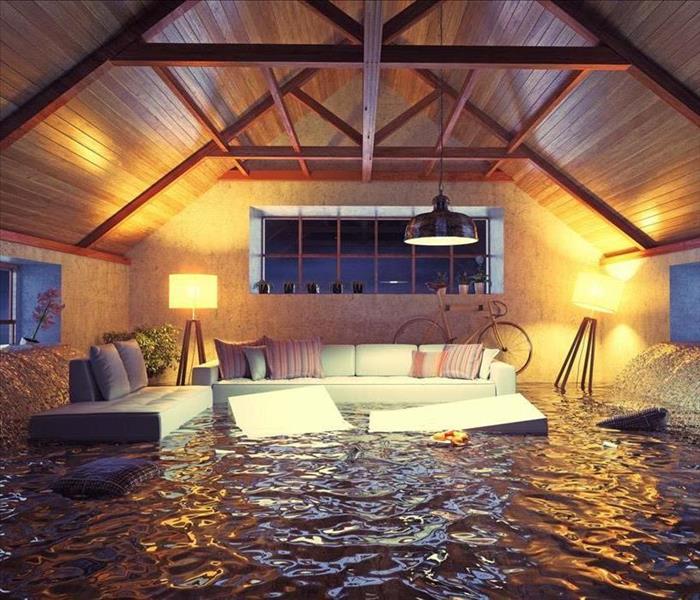 Dealing with flood damage can be a costly and time-consuming situation.
Dealing with flood damage can be a costly and time-consuming situation.
For businesses in Marble Hill, GA, it is more a matter of when not if flooding will happen. While it may not be possible to protect structures from flood damage, taking a proactive approach can help minimize losses and make dealing with the aftermath a little smoother.
Ways to Minimize Damage
Storm damage means trying to keep unwanted water from entering the building. Unfortunately, water can be tricky and find its way in through various means. Before the next storm starts brewing, consider the following to reinforce known areas of saturation:
- Keep drains and ditches free of leaves, mulch, and debris. If there is a storm drain nearby, ensure it is not blocked. Regularly clear debris from drains and ditches.
- Downspouts and gutters can easily get clogged, which means improper drainage onto the foundation. Regularly check them and keep them clean.
- Improper grading can lead to water accumulating around the foundation. Ensure the ground slopes away from it. Additional dirt or sod may be needed to get the right grading.
- The foundation itself can eventually have seal issues or small cracks. A regular foundation inspection makes it easier to find those small issues before they become a big one.
- If located in an area prone to floods, keep sandbags stored on the property that can be used to block rising waters.
Consider a Few Upgrades
If your business has experienced flood damage, you don’t have to deal with the cleanup alone. A water damage and restoration expert can help get your business back to “Like it never even happened.” Once your business is returned to normal, it may be worth considering adding a few upgrades to avoid a repeat. Flood skirts and barriers can be attached to windows and doors. There are also a number of flood detection systems on the market, including smart devices, that feature sensor and alarms when water is detected.
Dealing with flood damage can be a costly and time-consuming situation. Although it may not be possible to entirely avoid, staying ahead of the game by being prepared can make a big difference.
Cleaning Out Your Closet… And Pantry… And Basement… And: What Can You Salvage After a Flood?
9/2/2021 (Permalink)
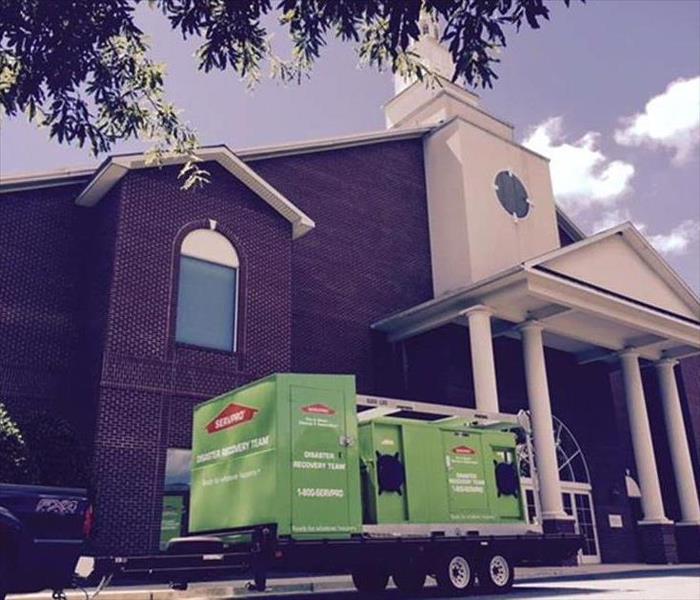 Content cleaning can be an exhausting process because it stresses you not only physically but emotionally.
Content cleaning can be an exhausting process because it stresses you not only physically but emotionally.
A flood has hit you, and now the long process of content cleaning begins. While you will likely want to keep everything and salvage as many memories as possible, the unfortunate reality is that flooding causes black water, which is toxic for both humans and pets. This does not mean that everything must go, but it does mean that you may have to part with some things that hold significant intrinsic value.
1. Nonporous Materials Can Likely Be Saved
As nonporous materials are things that cannot be penetrated by the water, these types of items can typically be salvaged. Some examples of nonporous materials are solid plastics, ceramics, metal, and glass, meaning that most dishes and even jewelry can be saved; however, all will have to be extensively disinfected.
2. Porous Materials Likely Can’t Be Saved
Unfortunately, as porous materials can easily be penetrated, these types of items likely can’t be saved. Some examples of porous materials are paper, wood, carpeting, drywall, insulation, and laminate, meaning that any photographs, draperies, flooring, and drywall that have been exposed to water should be removed because no amount of content cleaning will eliminate all the contaminants.
3. Seek Assistance from Professionals
It is understandable to be overwhelmed in this process. Flooding is invasive and destructive by definition, and no amount of preparation can prepare you for the emotional turmoil of a damaged home. Fortunately, you don’t have to make the decisions of what’s salvageable and not on your own because there are likely several restoration specialists in Forsyth, GA, who have the expertise to make that decision for you.
Content cleaning can be an exhausting process because it stresses you not only physically but emotionally; however, if you can go at the cleanup process systematically dividing items between porous and nonporous materials, you may find the process a little easier.
Yes, A Flood Cut Is Essential: Here Is What You Need To Know
6/14/2021 (Permalink)
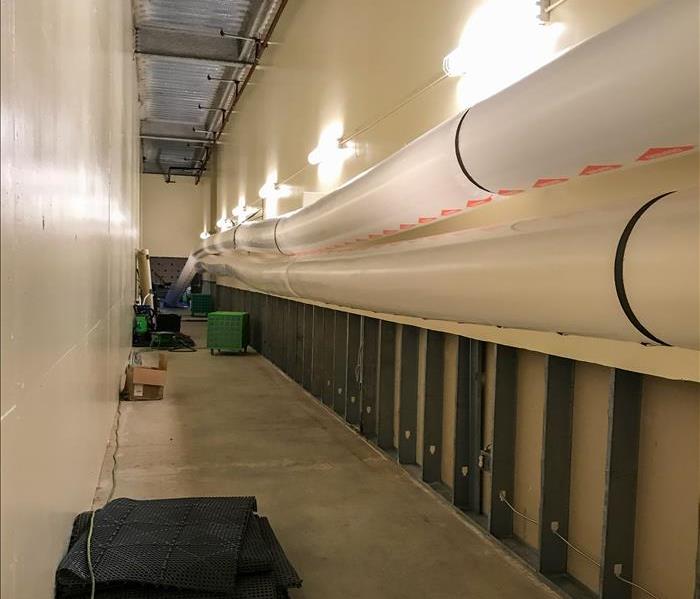 A flood cut is a tear-out within the drywall, at least 12 inches above the waterline.
A flood cut is a tear-out within the drywall, at least 12 inches above the waterline.
Are damp walls a serious concern? What impact does flooding have on your facility? Is cutting out the walls really needed? Commercial owners in Cumming, GA are likely to question the gravity of saturation, wondering about its hazardous nature and extensive cleanup procedures. Understand that floodwaters severely harm the structure; therefore, it's vital to perform drying methods and flood cuts.
What Is a Flood Cut?
Moisture quickly permeates porous materials; thus, as water pours into your building, drywall, flooring and objects readily absorb it. The soaked structure acts as a catalyst for harboring organisms, particularly fungus and bacteria. Within 24 hours, outbreaks can occur, spreading to the other rooms. To stop this act from happening, it's critical to eliminate the wetness.
A flood cut is a tear-out within the drywall, at least 12 inches above the waterline. Experts from a flood restoration company use moisture meters to determine the extent of the dampness. Often, more is drenched than the eye can see; therefore, technicians take excess to secure the premises. This tactic removes the water, cutting off the contaminant's catalyst.
Why Is It Effective?
Because flooding kicks off secondary damage, specialists should tend to the fluid buildup as efficiently as possible, mitigating further trouble. The flood cut opens up the wall space, permitting more air circulation and faster drying, particularly with studs and sills, which are hard to reach with industrial dehumidifiers alone. It's imperative to dry out the internal wall just as much as the outer zones.
How Soon Should It Be Completed?
Contamination occurs quickly, so this method works best when used within the first day or two. Delays only allow for more spread and require additional action.
If your establishment is impacted by flooding, seek professional help immediately. Expert care is essential to ensure that the area is dried completed. Flood cuts are a crucial tool for successful remediation.
Flooding Versus Storm Damage: 3 Differences
3/30/2021 (Permalink)
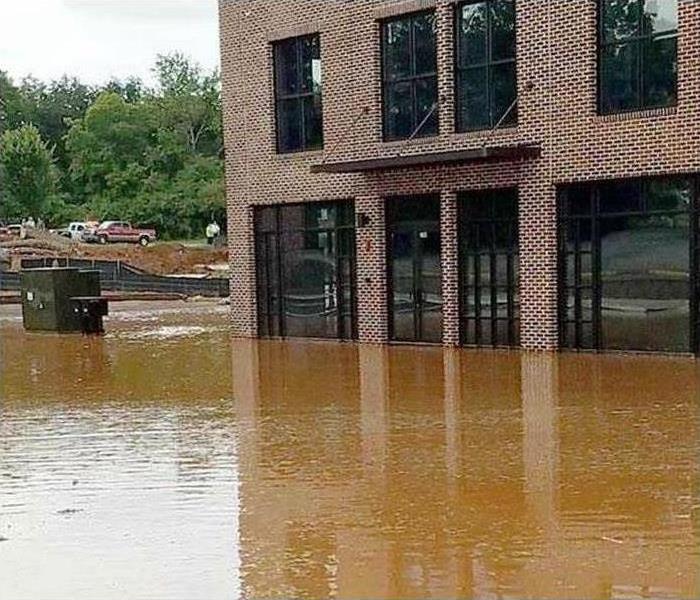 Flooded building in Cumming, GA.
Flooded building in Cumming, GA.
How Do Storm And Flooding Impact My Business
When you own a Cumming, GA business, the risk of storm and flooding damage may be high on your list of worries, especially when certain times of the year are known for violent weather. Storms may produce flooding, high winds and power outages; however, there are several differences between flood damage and other types of issues that result from storms, and understanding each may help you recover more quickly afterward.
1. Floods Contain Black Water
When flooding occurs at your business due to storms, the resulting influx of water is likely to come from a contaminated source, such as an overflowing creek or sewer. As a result, the porous building materials inside your business, such as drywall, may absorb this dirty water and cause stains and an unpleasant odor. You may have to replace such items.
2. Storm Damage Is More Varied
When storm damage occurs, it may be more varied and extended than flooding. High winds can break windows, tear away building materials and cause damage to your property's roof. When these types of problems occur, your storm repair and restoration service may have to spend more time ensuring all types of damage are repaired before you can reopen your business.
3. Insurance Differences
Some insurance companies define flood damage differently than that caused by storms, especially when the flooding came from an internal source, such as a broken pipe. Flooding caused by heavy rains may be covered under your policy; however, it is best to contact your local insurance representative and send photos of the damage before attempting to open a claim. You can protect damaged areas of your building by blocking broken windows with wood planks and using tarps to prevent rainwater from entering a damaged roof.
Flood damage and storms can severely affect your business in a variety of ways. Understanding how each might impact your bottom line may help you put you on the path to reopening more quickly and reducing downtime for your employees.
Frequently Asked Questions About FEMA
1/15/2021 (Permalink)
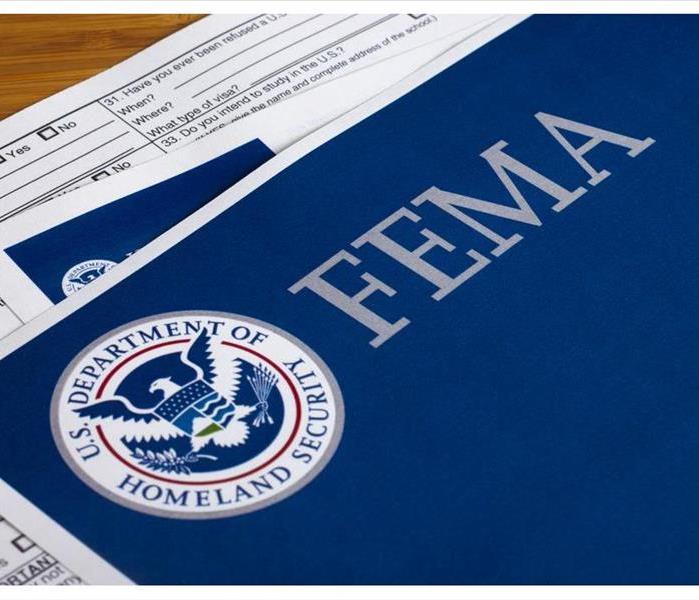 FEMA has grants that could provide financial assistance to the uninsured
FEMA has grants that could provide financial assistance to the uninsured
If you have recently experienced a storm, you may be interested in FEMA individual assistance. Here are some answers to frequently asked questions, so you know a little more about the program.
Who Is Eligible for Assistance?
There are a few qualifications you must meet to get individual assistance. Here are the general qualifications:
- You must be a U.S. citizen, non-citizen national, or qualified alien
- You must be able to verify your identity
- You cannot meet your needs with your current insurance
- A Qualified disaster has caused your needs
Are You Eligible if You Already Have Insurance?
Insurance is the main source of money you should rely on to put your life back together after a storm. Therefore, you are going to want to contact them immediately after the disaster strikes. However, if they do not offer you enough funds to rebuild, you could be eligible for additional assistance from FEMA.
Will FEMA Rebuild Your House?
The individual assistance offered by FEMA is designed to help uninsured or underinsured people pay for necessary expenses after a flood. However, this program is not a substitute for insurance. It is designed to get you back on your feet after a disaster. It cannot completely rebuild your house.
What Low-Interest Loans Are Available?
If you run a small business out of your home, you may be able to borrow enough money to pay for hiring remediation professionals and cover your economic losses. However, this money is designed to come from the Small Business Administration as a low-interest loan.
What Happens After You Apply?
Once you have filed a claim for a disaster in Jasper, GA, you can check on your application's status online. You will be notified of a decision via the online portal and through your primary contact information.
If you have recently experienced flooding, you could be eligible for individual assistance. This can help you get back on your feet after a disaster and ready to rebuild your life.
Roof Leaks: Finding and Repairing the Culprit
11/11/2020 (Permalink)
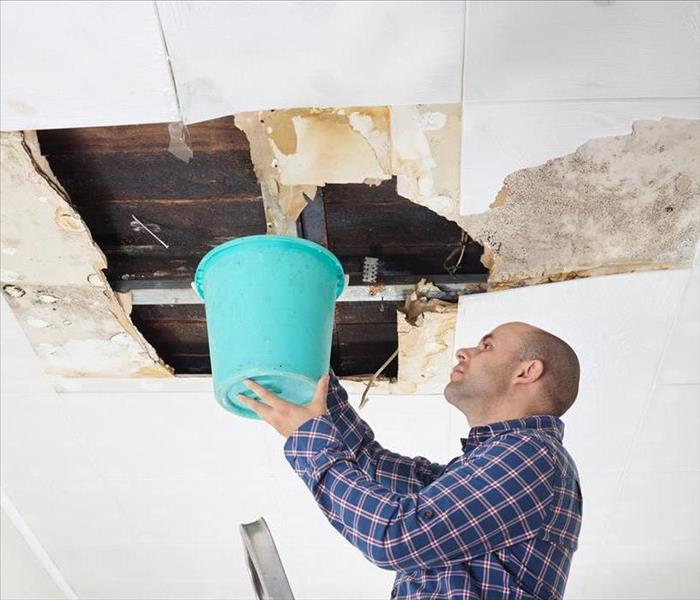 Roof leak in the Talking Rock, GA building
Roof leak in the Talking Rock, GA building
In 2021, can be easy to forget that the roof covering over your Talking Rock, GA, or Amicalola, GA business is vital to protecting everything within. The moment a roof leak happens, it quickly comes to the foreground. The degree of the damage will determine if a repair or replacement is needed. When dealing with a damaged roof, it is essential to determine the cause and immediately make needed repairs
Find the Source of the Roof Leak
Whether old or new, a number of culprits could cause a leak. If signs of a leak appear, below are the most frequent culprits.
Damaged or Missing Shingles – Weather can eventually begin to wreak havoc on a roof. From heavy rains to high winds and hail, the shingles can be blown off, loosened or cracked. When that happens the protective layers beneath them begin to deteriorate from exposure.
Cracked Flashing – Commercial buildings often have an array of attachments on their roofs. Whether it is a skylight or plumbing vents, those protrusions are sealed with rubber or metal flashing. If the seal begins to crack, it creates a prime place for water to begin dripping in.
Clogged Gutters – Proper drainage is essential to prevent leaks and flooding. If gutters or downspouts are clogged, it means water is pooling on the roof instead of flowing away from the property.
Repair Expectations
Once you find the source of the roof leak, quick action is needed to prevent further damage. The repair process may be as easy as replacing shingles or flashing or require more extensive work. Whether doing the repair on your own or hiring a professional, any saturate materials should be torn out and replaced to prevent mold growth. A water damage and restoration professional can help properly restore, clean and deodorize the affected area.
When a roof leak happens, finding the source and making repairs is essential to protecting your business and limiting damage.
3 Tips for Flood Cleaning in Your Home
10/20/2020 (Permalink)
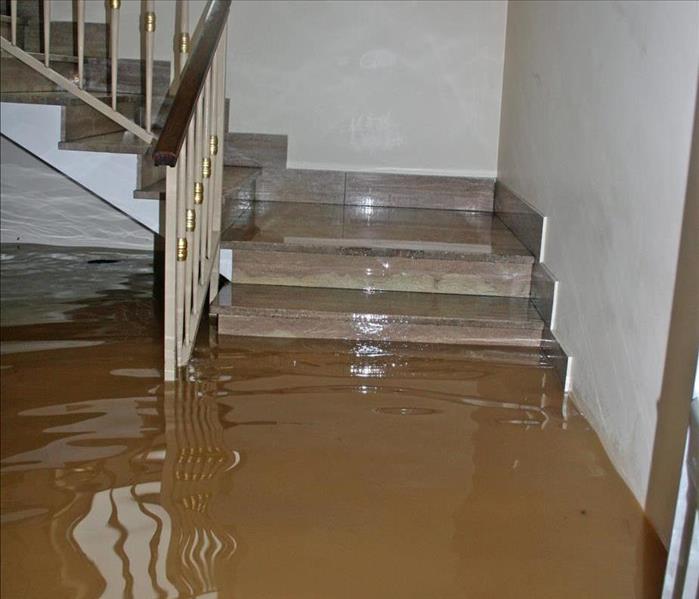 Storm causes flooding in a Dahlonega, GA home
Storm causes flooding in a Dahlonega, GA home
Flood Cleanup Process
After a storm causes flooding in your Dahlonega, GA, home, you may find yourself wondering the best way to clean up the mess, what cleaning requirements will need to be met, and what kind of equipment can be used.
1. Contact a Professional
After a storm causes flooding at your home a storm damage restoration service can perform a flood clean of the affected area. Contacting a professional service like this can help ensure that the people working to remove any flood waste are trained in the correct procedures and have access to any equipment they may need. A professional team can also look for any secondary damaged that may cause your home problems in the long term.
2. Follow Safety Guidelines
There are safety guidelines for a flood clean that include cleaning requirements. These are in place to help ensure that bacteria and other substances that may be carried by floodwater are removed correctly. A restoration service should have team members who are trained to know what the requirements are and how to follow them. In many cases, these are certified professionals capable of reaching the standard goals set by the CDC.
3. Use the Correct Equipment
It’s important to use the right equipment for the job any time you remove flood water from your home. Ensure that any pumps are rated for use with water, that personal protective gear is worn, and that a flood disinfectant is used for cleaning afterward. Using the right equipment is one way to ensure the job is done well, as well as ensuring that any cleaning methods use fall under EPA guidelines.
When working on a flood cleaning in your home you may want to contact a professional as they can help make sure that the cleaning requirements are met. Make sure to follow any recommended safety guidelines, and use the correct equipment for the job. If you have questions your restoration team should be able to help.
Use Caution During Flood Cleanup
8/7/2020 (Permalink)
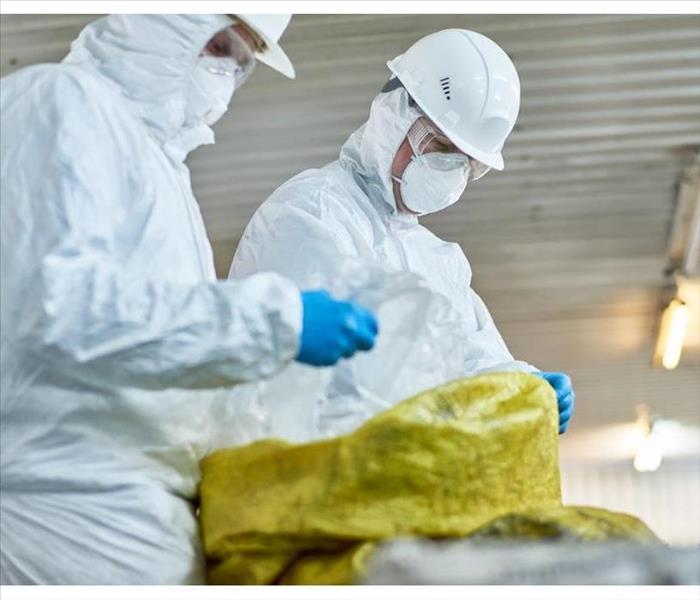 It is important to arm yourself with protective gear
It is important to arm yourself with protective gear
After raging waters rise in your Talking Rock, GA, home, safety has to always be the top concern. Once the flooding subsides, the main priority doesn’t change. The flood clean up process is complex and time-consuming. Unlike a pipe break, people are dealing with water that is potentially contaminated with sewage and other debris. Before diving into the work, unique cleaning requirements need to be considered.
Vital Safety Measures
Before dealing with anything that has come in contact with the floodwaters, it is important to arm yourself with protective gear. This includes wearing:
- Long pants
- Long-sleeved shirt
- Boots
- Disposable rubber gloves
- Goggles
- Face mask
This gear will create a barrier from the contaminants, which may include new mold growth, being breathed in or moved to unaffected areas. Safety gear should be worn whenever going into the affected area or handling any items.
Clean and Sanitize
Presented with the aftermath, the cleaning requirements go far beyond a simple dry out and wipe down. Along with drying out the home to avoid mold, proper cleaning will eliminate the potential bacteria and viruses that have entered the home. A flood disinfectant needs to be used on all surfaces to prevent the spread of contamination. Any items that can’t be cleaned or are saturated should be thrown away. Clothing, curtains and other textiles should be washed as soon as possible.
If the flooding is overwhelming, the best bet is to call a water remediation and restoration expert. They will have the expertise and tools to ensure a home is properly cleaned and restored. They also have the gear on hand to tackle the biggest problems and know-how to salvage more personal belongings than people may realize.
After a flood, people want to get things back to normal as soon as possible. Before jumping into the process, it is vital to follow cleaning requirements to ensure it is done safely and the right way.
 Weather.gov is a great resource to view your area's current and historical weather here in Forsyth County, GA.
Weather.gov is a great resource to view your area's current and historical weather here in Forsyth County, GA.





 24/7 Emergency Service
24/7 Emergency Service










